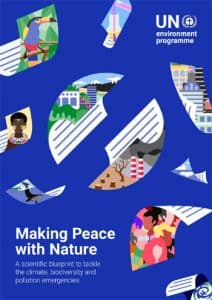Making Peace With Nature, a new report published by the United Nations Environment Programme (UNEP), synthesizes findings from recent global assessments, including those by the Intergovernmental Panel on Climate Change, the Intergovernmental Science-Policy Platform for Biodiversity and Ecosystem Services, and others. It proposes what the authors’ call “a scientific blueprint to tackle the climate, biodiversity and pollution emergencies.”
Introducing the report, UN Secretary-General António Guterres said: “Humanity is waging war on nature. This is senseless and suicidal. The consequences of our recklessness are already apparent in human suffering, towering economic losses, and the accelerating erosion of life on Earth.”
The report says the Earth faces a Triple Emergency: climate change, biodiversity loss and pollution. Lead author Robert Watson says the three issues “are all interrelated and have to be dealt with together. They’re no longer just environmental issues — they are economic issues, development issues, security issues, social, moral and ethical issues.”
This is clearly not a Marxist or ecosocialist report: the authors cling to the vain hope that corporations, especially the financial sector, will implement radical reforms without radical social change. Nevertheless, the very fact that it has been published by a mainstream organization and promoted as a call for for urgent action shows how serious the ‘Triple Emergency is. By summarizing the latest scientific research on those interlocked crises, they have produced an important resource that ecosocialists should study.
This summary of the report’s Key Messages was prepared by UNEP.
Summary
- Climate change, biodiversity loss and pollution add up to three self-inflicted planetary crises that are closely interconnected and put the well-being of current and future generations at unacceptable risk.
- Ambitious and coordinated action by governments, businesses and people around the world can prevent and reverse the worst impacts of environmental decline by rapidly transforming key systems including energy, water and food so that our use of the land and oceans becomes sustainable.
- Transforming social and economic systems means improving our relationship with nature, understanding its value and putting that value at the heart of our decision-making.
Unsustainable development is rapidly degrading Earth’s capacity to sustain human well-being
- Human prosperity and well-being – now and in the future – depend on the careful use of the planet’s finite space and remaining resources, as well as on the protection and restoration of its life-supporting systems and capacity to absorb waste.
- Current social, economic and financial systems fail to account for the essential benefits we get from nature and to provide incentives to manage ecosystems and natural capital wisely and maintain their value.
- Over the last 50 years, the global economy has grown nearly fivefold, due largely to a tripling in extraction of natural resources and energy that has fuelled growth in production and consumption. The world population has increased by a factor of two, to 7.8 billion people, and though on average prosperity has also doubled, about 1.3 billion people remain poor and some 700 million are hungry.
- Piecemeal and uncoordinated action on climate change, biodiversity loss and pollution is falling far short of what is needed to prevent environmental decline. That failure is threatening humanity’s future and putting the Sustainable Development Goals out of reach.
The world is failing to meet its commitments to limit environmental damage
- The world is on track for warming of at least 3°C above pre-industrial levels by 2100. That means missing the Paris Agreement target to keep warming well below 2°C and try to limit the increase to 1.5°C in order to avoid the worst impacts.
- None of the global goals for the protection of life on Earth and for halting the degradation of land and oceans have been fully met. Deforestation and overfishing continue, and one million species of plants and animals are threatened with extinction.
- While we are on course to restore the Earth’s protective stratospheric ozone layer, there is much to be done to reduce air and water pollution, safely manage chemicals, and reduce and safely manage waste.
Environmental decline is eroding progress towards the Sustainable Development Goals
- The burden of environmental falls most heavily on the poor and vulnerable. Wealthy countries export some of the impacts of their consumption and production to poorer nations through trade and waste disposal.
- Environmental change is undermining progress on ending poverty and hunger, providing clean water and sanitation, reducing inequalities and promoting sustainable economic growth, work for all and peaceful and inclusive societies.
- The deteriorating state of the planet threatens the achievement of health and well-being for all. Around a quarter of the global burden of disease stems from environment-related risks including animal-borne diseases (such as COVID-19), climate change, and exposure to pollution and toxic chemicals. Indoor and outdoor air pollution cause up to 7 million premature deaths per year.
- Environmental risks such as heatwaves, flooding, drought and pollution hamper efforts to make cities and other human settlements inclusive, safe, resilient and sustainable.
Earth’s interrelated environmental emergencies must be addressed together
- The interconnected nature of climate change, loss of biodiversity, land degradation, and air and water pollution means they must be addressed together to maximize the benefits and minimize trade-offs.
- Meeting the Paris Agreement targets requires more ambitious national climate commitments and rapid transformations in areas including energy systems, land use, agriculture, forest protection, urban development, infrastructure and lifestyles.
- By lowering the degree of warming, quickly reducing greenhouse gas emissions makes it easier and cheaper to adapt to climate change and protect progress toward the Sustainable Development Goals.
- The loss of biodiversity can be halted and reversed by expanding protected areas and providing space for nature while also addressing the drivers of degradation such as changing land and sea use, over-exploitation, climate change, pollution and invasive alien species.
- The adverse effects of chemicals and waste on the environment and human health can be substantially reduced by fully implementing existing international conventions and further strengthening the scientific basis of global policymaking and regulation.
Human knowledge, ingenuity, technology and cooperation can transform societies and economies and secure a sustainable future
- System-wide transformation can achieve well-being for all within the Earth’s capacity to support life, provide resources and absorb waste. Transformation involves a fundamental change in the technological, economic and social organization of society, including worldviews, norms, values and governance.
- Major shifts in policies, governance, regulation, incentives and investment are key to just and informed transformations. Opposition to change can be defused by redirecting subsidies to support alternative livelihoods and new business models.
- The COVID-19 pandemic and its economic fallout show the grave risks from ecosystem degradation as well as the need for international cooperation and greater social and economic resilience. Ensuring investments triggered by the crisis support transformative change is key to attaining sustainability quickly.
Transformed economic and financial systems can power the shift to sustainability
- Governments should incorporate full natural capital accounting into decision-making and incentivize businesses to do the same. Yardsticks such as inclusive wealth are superior to gross domestic product for measuring sustainable economic progress.
- Governments should include natural capital in measures of economic performance, put a price on carbon, phase out harmful subsidies, and redirect some of the more than US$5 trillion in annual subsidies to fossil fuels, non-sustainable agriculture and fishing, nonrenewable energy, mining, and transportation towards supporting low-carbon and nature friendly solutions. Investments in nature-friendly solutions and technologies in areas including water and food production can help mobilize the investments needed to attain the Sustainable Development Goals.
- Shifting taxation from production and labour to resource use and waste is important to promote a circular economy that uncouples prosperity from pollution and favours job creation.
- Developing countries need more support to address environmental challenges, including access to low-interest finance in order to build their capacity and overhaul accounting systems and policy frameworks.
- Reducing inequalities and the risk of social conflict from environmental degradation requires steps to promote equity and address individual and community rights to property, resources and education.
Everyone has a part to play in the transformation to a sustainable future
- All actors have individual, complementary and nested roles to play in bringing about cross-sectoral and economy-wide transformative change with immediate and long-term impact.
- Through international cooperation, policies and legislation, governments can lead the transformation of our societies and economies.
- The private sector, financial institutions, labour organizations, scientific and educational bodies and media as well as households and civil society groups can initiate and lead transformations in their domains.
- Individuals can facilitate transformation by learning about sustainability, exercising their voting and civic rights, changing their diets and travel habits, not wasting food and resources, and reducing their consumption of water and energy.
- Human cooperation, innovation and knowledge-sharing will create new social and economic possibilities and opportunities that can generate shared prosperity and
expanded well-being in the transformation to a sustainable future.





This is absolutely maddening. Obviously acceptable to the capitalist powers for it’s broad ambiguity, it reads like something on npr. Not surprisingly because the funding comes from the same sources. Touches damn near all the bases without assigning specific responsibility anywhere, like a natural disaster, it just happened. Very pleasing to the masters of the universe who have become the richest class in history precisely through the practices which have brought the planet to this perilous condition.
All of this sanctimonious bullshit aside only the substitution of the meeting of human need over private profit is going to get us out of this jam as best as can be. Which implies a lot of things and replacing capitalism with socialism is at the top of the list. To expect those who have brought us to this impasse to reverse their behavior, and nothing less would do, is stupid. They will tweak their behavior for ‘optics’ but will never sacrifice significant profit to the commonweal. Their understanding of how the world is supposed to work precludes any other result. So it’s capitalism or nature, socialism or barbarism, however you want to put it, revolution or death.